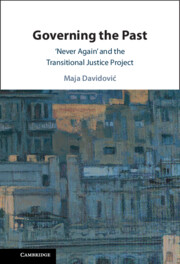Refine search
Actions for selected content:
718 results
1 - Democracy and Governance
- from Part I - Politics at the Apex
-
- Book:
- Democracy and Inequality in India
- Published online:
- 11 October 2025
- Print publication:
- 30 October 2025, pp 15-63
-
- Chapter
- Export citation
4 - Governance Shapers?
-
-
- Book:
- International Organizations Engaging the World
- Published online:
- 09 October 2025
- Print publication:
- 23 October 2025, pp 61-83
-
- Chapter
-
- You have access
- Open access
- HTML
- Export citation
11 - Drawing from AMR Experience for Better Prevention, Preparedness, and Response to Complex Health Threats under a One Health Approach
- from Part II - One Health and Contemporary Legal Structures
-
-
- Book:
- The Cambridge Handbook of One Health and the Law
- Published online:
- 25 September 2025
- Print publication:
- 09 October 2025, pp 157-180
-
- Chapter
- Export citation
1 - Introduction
-
-
- Book:
- The Cambridge Handbook of One Health and the Law
- Published online:
- 25 September 2025
- Print publication:
- 09 October 2025, pp 1-8
-
- Chapter
- Export citation
11 - The Performance of Manhood
- from Part III - Merchants in the Round
-
- Book:
- Making Merchants
- Published online:
- 19 September 2025
- Print publication:
- 09 October 2025, pp 165-185
-
- Chapter
- Export citation
11 - Design for Regulating a Thousand Cuts
-
- Book:
- Regulating a Thousand Cuts
- Published online:
- 27 September 2025
- Print publication:
- 09 October 2025, pp 310-330
-
- Chapter
-
- You have access
- Open access
- HTML
- Export citation
6 - 2007–2008
-
- Book:
- Choosing Defeat
- Published online:
- 07 October 2025
- Print publication:
- 07 October 2025, pp 161-196
-
- Chapter
- Export citation

The Cambridge Handbook of One Health and the Law
- Existing Frameworks, Intersections and Future Pathways
-
- Published online:
- 25 September 2025
- Print publication:
- 09 October 2025
An Analysis of Neoliberalism and the Reconfiguration of Gender in the Thai Political Domain
-
- Journal:
- TRaNS: Trans-Regional and -National Studies of Southeast Asia , First View
- Published online by Cambridge University Press:
- 18 September 2025, pp. 1-17
-
- Article
-
- You have access
- Open access
- HTML
- Export citation
Staging Legality: How Legitimacy Budgeting Codifies Symbolic Governance in China’s Charity Law
-
- Journal:
- Law & Social Inquiry , First View
- Published online by Cambridge University Press:
- 15 September 2025, pp. 1-34
-
- Article
- Export citation
The New Instrumental Turn in Nigerian Historical Scholarship
- Part of
-
- Journal:
- The Journal of African History / Volume 66 / 2025
- Published online by Cambridge University Press:
- 01 September 2025, e11
-
- Article
-
- You have access
- Open access
- HTML
- Export citation
17 - Conclusions for Stability and Re/politicization in Climate Governance
- from Part V - Reflections
-
-
- Book:
- Stability and Politicization in Climate Governance
- Published online:
- 07 August 2025
- Print publication:
- 21 August 2025, pp 254-266
-
- Chapter
-
- You have access
- Open access
- HTML
- Export citation
1 - Introduction
-
-
- Book:
- Stability and Politicization in Climate Governance
- Published online:
- 07 August 2025
- Print publication:
- 21 August 2025, pp 1-16
-
- Chapter
-
- You have access
- Open access
- HTML
- Export citation
8 - The ITF, ATP and WTA and the Governance of Global Tennis
- from Part 2 - Regulatory
-
-
- Book:
- Professional Tennis and Transnational Law
- Published online:
- 07 August 2025
- Print publication:
- 21 August 2025, pp 170-189
-
- Chapter
-
- You have access
- Open access
- HTML
- Export citation
Chapter Nine - Conclusion
- from Part II
-
- Book:
- From Manners to Rules
- Published online:
- 29 August 2025
- Print publication:
- 07 August 2025, pp 308-328
-
- Chapter
- Export citation
Governance of Carbon Dioxide Removal: Practitioners’ Perspectives on Fairness and Equity
-
- Journal:
- European Journal of Risk Regulation , First View
- Published online by Cambridge University Press:
- 31 July 2025, pp. 1-11
-
- Article
-
- You have access
- Open access
- HTML
- Export citation

Governing the Past
- ‘Never Again' and the Transitional Justice Project
-
- Published online:
- 30 July 2025
- Print publication:
- 07 August 2025
Change, Governance, and Diffusion of Institutional Logics in and Beyond Chinese Contexts
-
- Journal:
- Management and Organization Review / Volume 21 / Issue 3 / June 2025
- Published online by Cambridge University Press:
- 29 July 2025, pp. 417-442
-
- Article
-
- You have access
- Open access
- HTML
- Export citation
The governance of federated learning: a decision framework for organisational archetypes
-
- Journal:
- Data & Policy / Volume 7 / 2025
- Published online by Cambridge University Press:
- 28 July 2025, e53
-
- Article
-
- You have access
- Open access
- HTML
- Export citation
2 - Orders in Transition and Implications for Political Legitimacy
- from Part I - Setting the Stage
-
- Book:
- The Law and Politics of International Legitimacy
- Published online:
- 14 July 2025
- Print publication:
- 24 July 2025, pp 24-38
-
- Chapter
- Export citation
